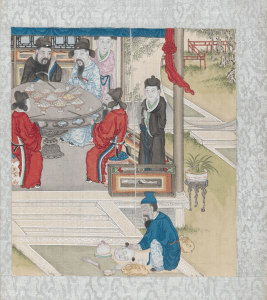Month: February 2021
3/5 Alex Murphy
Ph.D. Candidate, EALC
Enchantment of Politics, Poetics of Enchantment
Time: Friday, March, 3-5 pm CT
Zoom Registration: https://uchicago.zoom.us/meeting/register/tJ0lduCtrj4oGNCA5_qiFdBFa2CJ8ALDwof-
Discussant: Anthony Stott, Ph.D. Student, EALC/Comparative Literature
The Art and Politics of East Asia (APEA) workshop is proud to host Alex Murphy (Ph.D. Candidate, EALC), who will present his dissertation chapter, “Enchantment of Politics, Poetics of Enchantment.” He summarizes his chapter as follows:
This chapter concerns the advent of radio poetry in interwar Japan, and its role in the aural poeisis of public life at the outset of the Shōwa period. Following the 1923 Kantō earthquake, a prominent consortium of poets turned to oral recitation in order to channel the turbulent rhythms and sonorities of social life that seemed so far to elude expression in print, and to the emergent technology of radio broadcast as a means of harmonizing these disparate intensities toward a communal sense of “public resonance.” In so doing, however, the poets of this growing recitation movement had also to reckon with the politics involved in shaping the radio’s emergent listening public, especially as the escalation of acclamatory social movements signaled a more polyphonous body politic than the state was willing to accommodate. What the movement’s advocates proposed, then, was a mode of recitation that might, through various formal refinements, convey the impression of an informal, unadorned poetic voice—one shorn of embellishment, polished down to its most genuine and universal essence. By the same token, however, I argue that this mode of recitation served thereby to naturalize, or enchant a narrower political vision of post-quake public life by staging the state’s attenuations of audible speech—the filtration of dissent, opacity, or innuendo—as steps toward a radiogenic ideal of clarity, neutrality, and noiseless transmission.
Alex Murphy is a PhD candidate in the Department of East Asian Languages and Civilizations at the University of Chicago, focusing on modern Japanese literature and cultural history. His dissertation, entitled “What the Ear Sees,” deals with performance, sound media, and the politics of the voice in interwar Japan.
2/26 Jiayi Chen
Ph.D. Candidate, EALC
“Theorizing ‘Youxi’: Virtual Theatricality and Reading the Journey to the West”
Time: Friday, January 29th, 3-5 pm
Zoom Registration: https://uchicago.zoom.us/meeting/register/tJcpc-6pqzgrE9xhrGGpDKOFjM4eIOxvNv88
Discussant: Alia Breitwieser Goehr (Ph.D. Candidate, Comparative Literature)
The Art and Politics of East Asia (APEA) workshop is proud to host Jiayi Chen (Ph.D. Candidate, EALC), who will present her paper, “Theorizing ‘Youxi’: Virtual Theatricality and Reading the Journey to the West”. She summarizes the paper as follows:
Protected: Jiayi Chen’s Paper
2/12 Li Yifan
Chinese director of documentary “We Were SMART” (杀马特我爱你 shāmǎtè wǒ ài nǐ)
Time: Friday, February 12th, 7-9 pm CST
Zoom Registration:
https://uchicago.zoom.us/meeting/register/tJEtduCrrTgrGdWLJOH8yccPfR0kFYxd4rlu
The Chinese word 杀马特 (Shamate, written as SMART in the film’s English version) is a homophonic appropriation of the English word “smart.” Starting in the 2000s, this term has appeared on the Chinese Internet, labeling a form of fashion with its iconic hairstyle, makeup, and attire. Documentary We Were SMART looks into the lives of people who are associated with SMART, namely, young factory workers migrated from rural areas to the periphery of urban spaces. In addition to in-depth conversations with these people, the film also includes footage shot by them, offering an insider’s view of SMART’s life stories.
Li Yifan is a documentary filmmaker and artist in China. He teaches at Sichuan Fine Arts Institute. His other works include “Chronicle of Longwang: A Year in the Life of a Chinese Village” (乡村档案:龙王村2006影像文件) and “Before the Flood” (淹没).
This event is co-sponsored by the Center for East Asian Studies with generous support from a Title VI National Resource Center Grant from the U.S. Department of Education.


